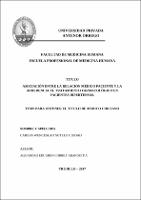Asociación entre la relación médico paciente y la adherencia al tratamiento farmacológico en pacientes hipertensos

View/
Download
(application/pdf: 314.0Kb)
(application/pdf: 314.0Kb)
Date
2018Author(s)
Sotelo Ciudad, Carlos Wenceslao
Metadata
Show full item recordAbstract
OBJETIVO: Determinar si existe asociación entre la relación médico
paciente deficiente y la no adherencia al tratamiento farmacológico en
pacientes con hipertensión arterial en el Hospital de Especialidades
Básicas La Noria, en Trujillo en el año 2016.
MATERIAL Y MÉTODO: Se realizó un estudio observacional, de
casos y controles en 172 casos y 172 controles
RESULTADOS: el porcentaje de la deficiente relación médico paciente,
en personas que no tuvieron adherencia al tratamiento farmacológico fue
14.5%, cifra mayor que los individuos que tuvieron adherencia al
tratamiento, cuyo porcentaje fue 7%, con diferencias estadísticas
significativas (p= 0.018). La mala relación incrementa en casi dos veces
la probabilidad de no adherencia al tratamiento farmacológico
antihipertensivo con un OR= 2.26 con un IC95% de 1.10 a 4.68.
CONCLUSIONES: Comparativamente la frecuencia porcentual de la
mala relación médico paciente es superior en pacientes sin adherencia al
tratamiento farmacológico que en pacientes adherentes a dicho
tratamiento. La mala relación médico paciente se asocia con la no
adherencia al tratamiento farmacológico como factor de riesgo. THE AIM: Determine if there is association between the relationship
medical patient deficient and non-adherence to drug treatment in patients
with hypertension in Specialties Basic La Noria Hospital, in Trujillo in
2016.
MATERIAL AND METHOD: An observational study of cases and
controls, was conducted in 172 cases and 172 controls
RESULTS: the percentage of the poor patient physician relationship, in
people who had no adherence to drug treatment was 14.5%, a figure
greater than individuals who had adherence to treatment, whose
percentage was 7%, with significant statistical differences (p = 0.018).
The bad relationship increases at nearly twice the likelihood of nonadherence
to the pharmacological antihypertensive therapy with an OR
= 2.26 with a 95% from 1.10 to 4.68.
CONCLUSIONS: Comparatively bad patient medical relation
percentage frequency is higher in patients without adherence to
pharmacological treatment that patient’s adherents said treatment. The
poor doctor patient relationship is associated with non-adherence to drug
treatment as a risk factor.
Collections
- Medicina Humana [2969]

